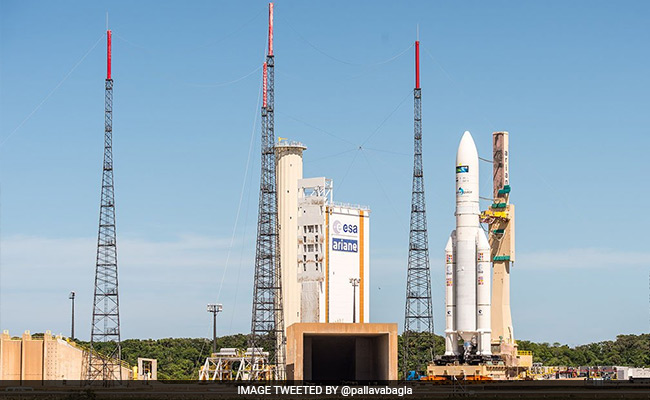SRO To Launch A Huge Satellite Tonight
 KOURAU (French Guiana, South America) : The Indian Science Research Organisation will launch its heavy communications satellite GSAT-18 from the rain forests of French Guiana, South America. The lift-off is expected between 2 am and 3.15 am on Wednesday.
KOURAU (French Guiana, South America) : The Indian Science Research Organisation will launch its heavy communications satellite GSAT-18 from the rain forests of French Guiana, South America. The lift-off is expected between 2 am and 3.15 am on Wednesday.GSAT-18 weighs 3,404 kg and is too heavy for the Indian Geo-Synchronous Satellite Launch Vehicle PSLV.The weight of the massive satellite meant that it needed a heftier rocket to carry it. The ISRO has settled on the European Ariane-5.
Ariane-5 is one of the world’s largest and most reliable rockets. The 52-meter high rocket, weighing 777-ton, has had 73 successful consecutive launches.
“Ariane-5 is a reliable workhorse of the European consortium and the launch should go off well,” ISRO chairman Dr Kiran Kumar told ndtv. On this round, it is also expected to launch the Sky Muster II for the Australian National Broadband Network. India and France have had a long-standing co-operation and this will be India’s 20th launch using the French consortium.
Two more satellite launches are in the pipeline where Ariane-5 rockets will be used. The next one, GSAT-17, is expected to be launched in 2017.
But scientists expect thereafter, India’s own heavy lift launcher the GSLV Mk III, which is currently being developed, will take up the task.
The GSAT-18, a communication satellite, is carrying 48 transponders, which is expected to re-transmit signals received from earth over a broader area.
This will help expand banking facilities and television, telecommunication, Digital Satellite News Gathering and broadband satellite communications, The ISRO will be spending nearly double of what it would have spent if an Indian rocket had been used.
“Ariane-5 is a reliable workhorse of the European consortium and the launch should go off well,” ISRO chairman Dr Kiran Kumar told ndtv. On this round, it is also expected to launch the Sky Muster II for the Australian National Broadband Network. India and France have had a long-standing co-operation and this will be India’s 20th launch using the French consortium.
Two more satellite launches are in the pipeline where Ariane-5 rockets will be used. The next one, GSAT-17, is expected to be launched in 2017.
But scientists expect thereafter, India’s own heavy lift launcher the GSLV Mk III, which is currently being developed, will take up the task.
The GSAT-18, a communication satellite, is carrying 48 transponders, which is expected to re-transmit signals received from earth over a broader area.
This will help expand banking facilities and television, telecommunication, Digital Satellite News Gathering and broadband satellite communications, The ISRO will be spending nearly double of what it would have spent if an Indian rocket had been used.

